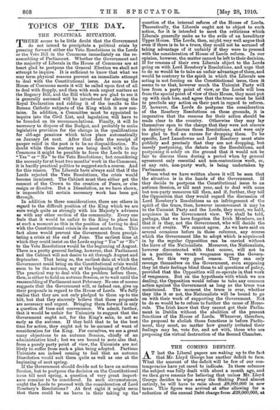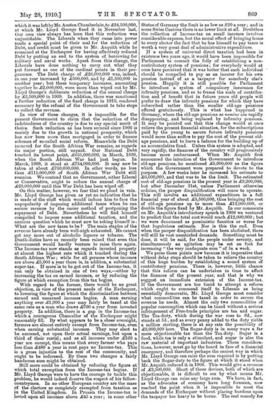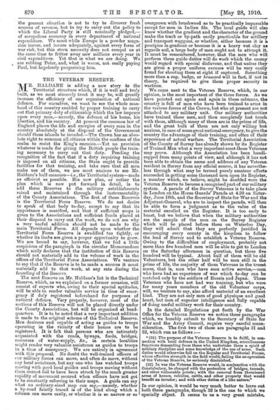THE COMING DEFICIT.
AT last the Liberal papers are waking up to the fact that Mr. Lloyd George has another deficit to face. What the amount of the deficit will be few of our con- temporaries have yet cared to indicate. In these columns the subject was fully dealt with about a month ago, and we then gave reasons for believing that unless Mr. Lloyd George decides to wipe away the Sinking Fund almost entirely, he will have to raise about £8,000,000 in new taxes. This figure was arrived at after allowing for a reduction of the annual Debt charge from £28,000,000, at which it was leftbyMr. Austen Chamberlain,to £24,500,000, at which Mr. Lloyd George fixed it in November last. Our own view always has been that this reduction was unjustifiable. The Liberals when they came into power made a special point of their zeal for the reduction of Debt, and credit must be given to Mr. Asquith while he remained at the Exchequer for having effectively reduced Debt by putting an end to the system of borrowing for military and naval works. Apart from this change, the Liberals have done nothing to carry out what they put forward as one of the cardinal points in their pro- gramme. The Debt charge of £28,000,000 was, indeed, in one year increased by £500,000, and by £1,500,000 in another year; but these temporary increases, amounting together to £2,000,000, were more than wiped out by Mr. Lloyd George's deliberate reduction of the annual charge by £3,500,000 in 1909. In addition, there was sanctioned a further reduction of the fixed charge in 1910, rendered necessary by the refusal of the Government to take steps to collect the revenue.
In view of these changes, it is impossible for the present Government to claim that the reduction of the indebtedness of the country is due to any special merit of theirs. Such reduction as has been secured since 1906 is mainly due to the growth in national prosperity, which has now been more than mortgaged in order to finance schemes of so-called social reform. Meanwhile the Debt incurred for the South African War remains, as regards its major portion, still unpaid. Our National Debt touched. its lowest point, £635,000,000, in March, 1899, when the South African War had just begun. In March, 1909, it stood at £754,000,000. It may now be taken at about £750,000,000. In other words, no less than £115,000,000 of South African War Debt still remains. We contend that no Government, either Liberal or Conservative, ought to reduce the annual charge of £28,000,000 until this War Debt has been wiped off.
On this matter, however, we fear that we plead in vain. Mr. Lloyd George has given as yet no indication that he is made of the stuff which would induce him to face the unpopularity of imposing additional taxes when he can secure revenue by the easier method of postponing the repayment of Debt. Nevertheless he will find himself compelled to impose some additional taxation, and the anxious question which he must now be asking himself is : What are the new taxes to be ? The main staples of the revenue have already been well-nigh exhausted. He cannot get any more out of alcoholic liquors or tobacco. The Death-duties have so recently been raised that even this Government would hardly venture to raise them again. The Income-tax now stands as regards invested property at almost the highest rate which it touched during the South African War ; while for all persons whose incomes are above £5,000 a year there is, in additon, a substantial super-tax. If more is to be got out of the Income-tax, it can only be obtained in one of two ways,—either by increasing the tax on earned incomes, or by reducing the figure at which exemption from this tax begins. With regard to the former, there would be no great objection, in view of the present needs of the Exchequer, to lowering the figure at which the discrimination between earned and unearned incomes begins. A man earning _anything over £1,000 a year may fairly be taxed at the same rate as a man who draws .2700 a year from invested property. In addition, there is a gap in the Income-tax which a courageous Chancellor of the Exchequer might reasonably fill. By what appears to be a sheer oversight, farmers are almost entirely exempt from Income-tax, even when earning substantial incomes. They may elect to be assessed, not upon their actual earnings, but upon a third of their rental; and as all incomes under £160 a year are exempt, this means that every farmer who pays less than £480 a year in rent pays no Income-tax. This is a gross injustice to the rest of the community, and ought to be redressed. By these two changes a fairly handsome sum might be obtained.
Still more could be obtained by reducing the figure at which total exemption from the Income-tax begins. If Mr. Lloyd George were to have the courage to tackle this problem, he would indeed deserve the respect of his fellow- countrymen. In no other European country are the mass of the electors so completely exempted from taxation as in the United Kingdom. In Prussia the Income-tax is _levied upon all incomes above £45 a year; in some other States of Germany the limit is as low as £20 a year ; and in some Swiss Cantons there is no lower limit at all. Doubtless the collection of Income-tax on small incomes involves considerable expense, but the moral effect of bringing home to every elector the fact that he has himself to pay taxes is worth a, very great deal of administrative expenditure.
If a system of universal direct taxation had been in existence two years ago, it would have been impossible for Parliament to commit the folly of establishing a non- contributory system of pensions ; for everybody would. at once have perceived that it was better that each individual should be compelled to pay as an insurer for his own pension instead of as a taxpayer for somebody else's pension. Happily it is still possible for Parliament to introduce a system of compulsory insurance for infirmity pensions, and so to frame the scale of contribu- tion and of benefit that in future years old people will prefer to draw the infirmity pensions for which they have subscribed rather than the smaller old-age pensions offered gratuitously. This is what has happened in Germany, where the old-age pensions co nomine are rapidly disappearing, and being replaced by infirmity pensions. It may be pointed out that this change would at once relieve the present financial situation, for the subscriptions paid by the young to secure future infirmity pensions would more than suffice to pay the cost of the present old- age pensions, and to leave a balance for the building up of an accumulative fund. Unless this system is adopted, and very rapidly, the finances of the country will progressively become more embarrassed. When Mr. Asquith first announced the intention of the Government to introduce old-age pensions, he mentioned £5,000,000 as the figure which the Government were prepared to devote to the purpose. A few weeks later he increased his estimate to £6,000,000, and that was to be the limit. The estimated cost of old-age pensions in the present year is £9,200,000, but after December 31st, unless Parliament otherwise ordains, the pauper disqualification will cease to operate. This will involve an additional expenditure in a full financial year of about .23,500,000, thus bringing the cost of old-age pensions up to more than £12,000,000, or double the figure fixed by Mr. Asquith. In our comments on Mr. Asquith's introductory speech in 1908 we ventured to predict that the total cost would reach £12,000,000 ; but we were denounced as pessimistic fanatics or worse for that lugubrious estimate. Nor is this the end. Even when the pauper disqualification has been abolished, there will still be vast unsatisfied demands. Something must be done, it will be said, for the people under seventy, and simultaneously an agitation may be set on foot for increasing " the very inadequate sum " of 5s. a week. We press these points now because it is imperative that without delay steps should be taken to relieve the country of this huge burden by establishing a sound system of contributory pensions. There is, however, little chance that this reform can be undertaken in time to affect the finances of the present year, and that is why we suggest an immediate extension of the Income-tax. If the Government are too timid to attempt a reform which ought to commend itself to Liberals as being essentially democratic, Mr. Lloyd George must consider what commodities can be taxed in order to secure the revenue he needs. Almost the only two commodities of popular consumption which can be taxed without a serious infringement of Free-trade principles are tea and sugar. The Tea-duty, which during the war rose to 8d., now stands at 5d., and as every penny added to the duty yields a million sterling, there is at any rate the possibility of £3,000,000 here. The Sugar-duty is in many ways a far more objectionable tax than the Tea-duty. Sugar is a food, while tea is only a stimulant, and sugar is also the raw material of important industries. These considera- tions, however, must go by the board in face of a financial emergency, and therefore perhaps the easiest way in which Mr. Lloyd George can raise the sum required is by putting back the Sugar-duty to the figure at which it stood when Mr. Asquith reduced it in 1908. This would give a revenue of £3,500,000. Short of these devices, both of which are objectionable, it is difficult to see by what means Mr. Lloyd George can raise any large sum. We have, in fact, as the advocates of economy have long foreseen, now reached the point when it is impossible to meet the demands of the Exchequer without placing burdens upon the taxpayer too heavy to be borne. The real remedy for the present situation is not to try to discover fresh sources of revenue, but to try to carry out the policy to which the Liberal Party is still nominally pledged,— of scrupulous economy in every department of national expenditure. We must while Europe is a powder maga zine insure, and insure adequately, against every form of war risk, but this stern necessity does not compel us at the same time to fritter away new millions every year in civil expenditure. Yet that is what we are doing. We are robbing Peter, and, what is worse, not really paying Paul, but hopelessly pauperising him.
















































 Previous page
Previous page